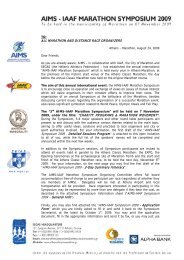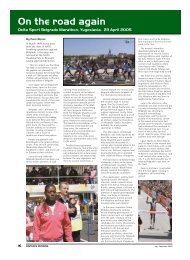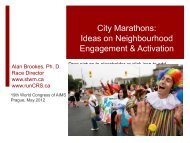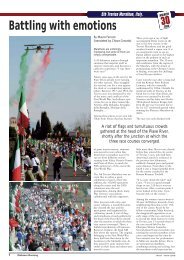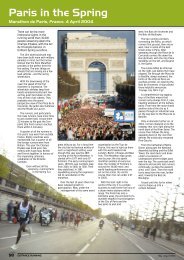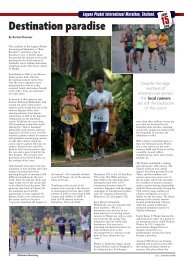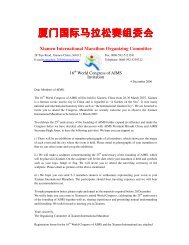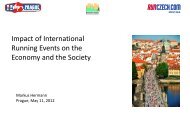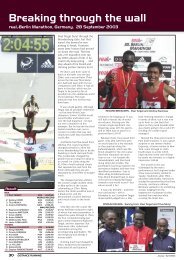Children and Marathoning Final Version 11.02 - AIMS
Children and Marathoning Final Version 11.02 - AIMS
Children and Marathoning Final Version 11.02 - AIMS
Create successful ePaper yourself
Turn your PDF publications into a flip-book with our unique Google optimized e-Paper software.
American Academy of Pediatrics (AAP) in May 2000 addresses the benefits of physical<br />
fitness <strong>and</strong> activity in schools (1). The key point of this statement is that positive health<br />
related behaviors acquired in childhood are more likely to be carried into adulthood<br />
(1,2,3). Thus, aerobic distance running for fitness as a child can clearly be beneficial to<br />
one's health as an adult (1,4). However, such fitness can be attained without ever<br />
approaching the rigors of training <strong>and</strong> distance covered in preparing for <strong>and</strong> running in<br />
marathons (5).<br />
In another such statement in June 2001 titled "Organized Sports for <strong>Children</strong> <strong>and</strong><br />
Preadolescents", the AAP committee outlines clear recommendations for childhood<br />
involvement in organized sports (6). The overall suggestion is to set reasonable goals for<br />
the child including acquire basic motor skills, increase physical activity levels, learn<br />
social skills to work as a team, learn good sportsmanship <strong>and</strong> have fun. One could<br />
contend that marathon participation could meet many of these goals. However, in this<br />
same statement, the AAP committee implies that sporting activity should be geared to<br />
meet the developmental level of children <strong>and</strong> adolescents in regard to their physical<br />
abilities, cognitive capacities, initiative <strong>and</strong> interest (6,7). This is not possible for a child<br />
marathoner. Emotional burnout is a real phenomenon that can have the exact opposite<br />
effect of that intended by participation. <strong>Children</strong> may develop feelings of failure <strong>and</strong><br />
frustration when the dem<strong>and</strong>s, both physical <strong>and</strong> cognitive, exceed their internal<br />
resources.<br />
Yet another statement published by the AAP in July 2000 addresses intensive<br />
training <strong>and</strong> sports specialization in young athletes (8). This statement warns against<br />
early specialization due to negative psychological effects. Most athletes report elite-<br />
3




